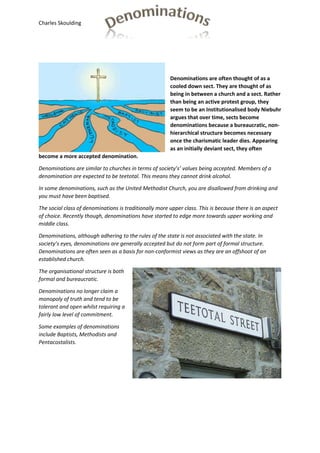
24 9 13 denominations
- 1. Charles Skoulding Denominations are often thought of as a cooled down sect. They are thought of as being in between a church and a sect. Rather than being an active protest group, they seem to be an Institutionalised body Niebuhr argues that over time, sects become denominations because a bureaucratic, non- hierarchical structure becomes necessary once the charismatic leader dies. Appearing as an initially deviant sect, they often become a more accepted denomination. Denominations are similar to churches in terms of society’s’ values being accepted. Members of a denomination are expected to be teetotal. This means they cannot drink alcohol. In some denominations, such as the United Methodist Church, you are disallowed from drinking and you must have been baptised. The social class of denominations is traditionally more upper class. This is because there is an aspect of choice. Recently though, denominations have started to edge more towards upper working and middle class. Denominations, although adhering to the rules of the state is not associated with the state. In society’s eyes, denominations are generally accepted but do not form part of formal structure. Denominations are often seen as a basis for non-conformist views as they are an offshoot of an established church. The organisational structure is both formal and bureaucratic. Denominations no longer claim a monopoly of truth and tend to be tolerant and open whilst requiring a fairly low level of commitment. Some examples of denominations include Baptists, Methodists and Pentacostalists.